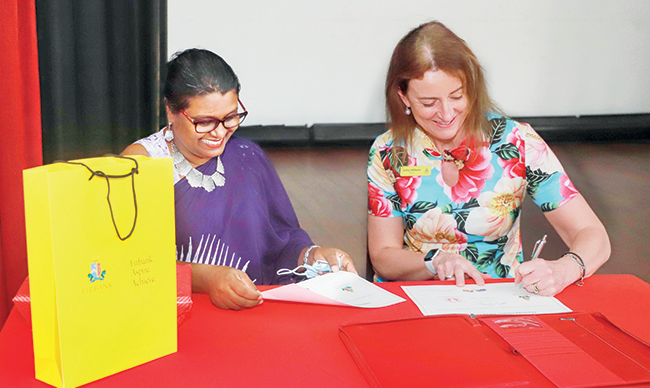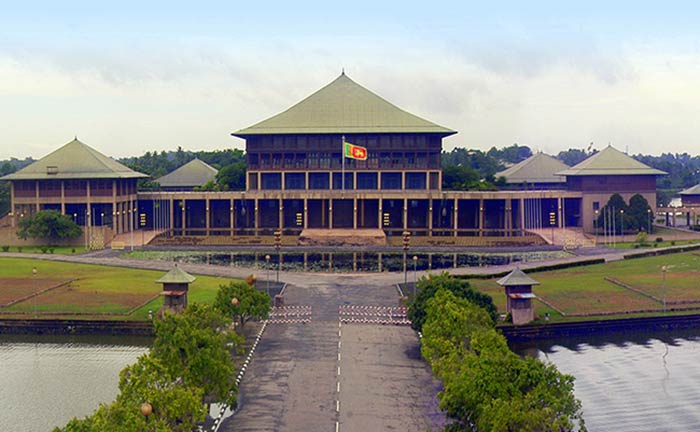News
Melbourne’s Firbank Grammar School partners with Ladies’ College Colombo to offer VCE in Sri Lanka

Newly designated Australian High Commissioner to Sri Lanka Paul Stephens marked his first official appearance in his new role at the launch of a landmark partnership between Firbank Grammar School in Melbourne, Australia, and Ladies’ College Institute of Professional Studies in Colombo on Friday, 12 August 2022, through which Firbank will support Ladies’ College to provide young men and women the opportunity to obtain the Victorian Certificate of Education (VCE).
The High Commissioner’s attendance at the event coincides with the 75th year of diplomatic relations between Sri Lanka and Australia, signifying the depth of long-term collaboration behind this partnership between the two educational institutions, which will see experienced mentors from Firbank Grammar School working regularly with educators at Ladies’ College to ensure that the VCE programme is delivered in line with the high standards that have earned Firbank its reputation as one of Melbourne’s leading Schools.
Thus, through this partnership, which is facilitated by administrative support from AustraLanka International Academy, Ladies’ College will allow Sri Lankan students to benefit from Australian education without having to leave the country. Students in the VCE programme at Ladies’ College will share the same experience as students studying the VCE in Melbourne, with access to the same assessments and examinations.
The launch event, which was also attended by Firbank Grammar School Principal Jenny Williams and Director of International Operations Wendy Grant, alongside Ladies’ College Vice Principal Ranmalee Balasooriya and Ladies’ College Institute of Professional Studies Chief Operating Officer Sunimal Fernando, as well as AustraLanka International Academy Director Amila Jayasuriya, began with the traditional lighting of the oil lamp, before representatives from both schools formally signed the partnership agreement.
This is the first such partnership of its kind, where an Australian education institution has undertaken a long-term engagement with a local counterpart to consistently maintain and improve educational standards. While teachers will benefit from an evolving and improving curriculum, students gain the advantage of more holistic educational and assessment methods that go far beyond end-of-year exams.
Speaking about this at the launch event, Firbank Grammar School Director of International Operations Wendy Grant explained that Firbank Grammar School wants all its students, domestic and international, to see themselves as part of the global community, adding: “When they set their sights on success, they make a difference not only in their own countries, but across the world. The relationships that students develop internationally, we believe, will assist this, and help build a collaborative, cooperative global village into the future.”
This concept of the global village is an integral part of the vision of Firbank Grammar School, which has extensive experience in international education, and continues to successfully work with ten partner schools in China and Vietnam.
Wendy also noted that Firbank’s foray into Sri Lanka had long been in the works, with several Sri Lankans having worked with the school in Melbourne, and some of them being Ladies’ College alumni – thus, this partnership was born of the same collaborative culture that it seeks to inculcate in students through its VCE programmes.
News
Parliament workers on warpath over allowance reductions

Parliamentary staff members are contemplating trade union action in protest against what they describe as a downward revision of their allowances.
The salary revision, as detailed in a circular numbered DMS/Salary Revision/2025-1 (Management Services Circular 04/2025) dated March 25, 2025, has resulted in a reduction of Parliament workers’ allowances, and the decreases which vary, based on staff grades, range from 70% to 39%, raising concerns among Parliament staff, according to sources.
The 32-page circular, addressed to Secretary General of Parliament Kushani Rohanadheera, has been signed by Secretary to the Ministry of Finance, Planning, and Economic Development K. M. Siriwardhana.
Following the announcement of those revisions, parliamentary employees have expressed dissatisfaction, with their unions planning industrial action in the coming days. Sources confirmed that the staff members had already registered their protest with the parliamentary authorities.
The new salary revision has sparked widespread discontent among staff members.
Our attempts to contact General Secretary of Parliament Kushani Rohandheera were not successful.
By Saman Indrajith
News
Japanese funding for project meant to help gender-based violence victims

Japan has funded a project to strengthen Sri Lanka’s commitment to tackling GBV (gender-based violence) and ensuring that survivors were not left without access to critical services.
As part of this project, six more Emergency Waiting Areas (EWAs) will be established in the coming weeks in Dharmapuram (Kilinochchi district), Murunkan (Mannar district), Uppuveli (Trincomalee district), Opanayake (Ratnapura district), Walapane (Nuwara Eliya district), and Modera (Colombo district).
Recently, Japanese ambassador in Colombo Akio Isomata and UNFPA Sri Lanka Representative Kunle Adeniyi, handed over the newly constructed Japan-funded EWA at the Kalutara South Police Station. The Japanese embassy said that this initiative was meant to ensure that survivors received the protection, dignity, and support they deserve when seeking assistance from law enforcement authorities.
The embassy said that there was a growing network of operational EWAs across Sri Lanka, including Jaffna, Mirihana, Pudukuduirippu, Nuwara Eliya, Mundalam, Batticaloa, and Kandy, where over 4000 women and children received support last year. These safe spaces serve as temporary resting areas, providing survivors of GBV with protection, psychosocial support, medical referrals, legal aid, and a survivor-centered approach to justice, the embassy said.
The establishment of the Kalutara South EWA was made possible with the generous funding of USD 34,000, from the People of Japan, and the construction was supported by World Vision Lanka.
Ambassador Isomata reaffirmed Japan’s continued dedication to supporting women and children in Sri Lanka and emphasized the role of safe spaces in ensuring a future free from violence. “Japan has been promoting the protection of women and children in Sri Lanka since Sri Lanka became a partner country for Japan in 2018 in promoting the Women, Peace and Security agenda. This project also includes training for police officers handling victims, especially female officers, so that victims would feel safer in seeking refuge and counseling. I hope this project will be expanded by Sri Lanka’s Ministry of Public Security and Police in order to strengthen the mechanism to protect women and children in vulnerable situations. It is also essential for Sri Lanka to ensure the legal measures against the violence and support for the self-reliance of women and children who seek refuge.”
Speaking at the ceremony, UNFPA Sri Lanka Representative, Kunle Adeniyi, underscored the significance of survivor-centered approaches in addressing GBV. “For a survivor, the decision to seek help is often fraught with fear: fear of judgment, disbelief, or retaliation. When they walk into a police station, they should not only find protection but also compassion and care. A survivor’s first interaction with law enforcement can shape their entire journey toward healing and justice. If they are met with understanding, respect, and support, they are more likely to pursue the help they need.”
News
Outgoing US Ambassador tells Lanka to train its citizens to ensure peace through strength

Outgoing US Ambassador Julie Chung has stated that Sri Lanka needs to train its citizens not only for the jobs of the future, but also for the military of the future, to ensure it can maintain peace through strength.
Addressing the faculty and students at the National Defence College, Diner’s Club, in Colombo, recently, the Ambassador said: “I want to emphasize the critical links between prosperity and strength, and the connection between economic security and national security. Economic security is not just about prosperity – it is intrinsically linked to national sovereignty. A strong economy empowers a nation to make independent decisions, free from undue external influence. This is particularly crucial for Sri Lanka, given its strategic location and the economic opportunities and security risks associated with its maritime domain, including sitting on the sea lanes transporting 2/3 of the world’s oil. Sri Lanka’s ability to service and protect these shipping lanes is an economic opportunity, but it is also a national and regional security challenge, with regional competitors seeking their own advantages. As Sri Lanka’s economy strengthens, it will be better equipped to independently navigate these sensitive geopolitical waters.
“In recent years, Sri Lanka has seen these risks clearly. In the lead-up to the 2022 economic crisis, Sri Lanka found itself in a precarious position. Faced with mounting fiscal pressures and sustained public protests, the Sri Lankan government sought debt relief from creditor countries. This decision to bilaterally negotiate debt outside an IMF programme would ultimately be insufficient to avoid a default and opened the door for some nations to press Sri Lanka for political concessions while also leaving Sri Lanka vulnerable to economic coercion. Economic vulnerability can give foreign powers leverage over national decisions, impacting not just on the economy but the very fabric of national security.
“During my three years in Sri Lanka, I’ve seen a remarkable turnaround in the country’s economy, but the journey is far from over. A quarter of Sri Lankans are still living in poverty. Sri Lanka still depends on a handful of industries for most of its foreign currency and most of its growth. Inefficient state-owned enterprises burden the economy while red tape and opaque regulations hamper foreign investment. Now that the economy has stabilised, long-needed structural reforms are the necessary next step to ensure Sri Lanka gets on a long-term growth path. Sri Lanka needs to train its citizens not only for the jobs of the future, but also for the military of the future, to ensure it can maintain peace through strength.
“The Indo-Pacific region remains one of the most politically dynamic and economically influential areas in the world. As an island maritime nation, Sri Lanka’s economic security and national security are directly tied to the maritime domain. Because of this, we all have a stake in keeping an open, free, and peaceful Indo-Pacific.
“Sri Lanka’s commitment to this goal strengthens its security framework, aligning with global standards and practices. Given its critical location in the Indian Ocean, maritime domain awareness is essential to ensuring our trade routes in the region remain secure and unhindered. These routes are the lifeblood of Sri Lanka’s economy, and by safeguarding them, Sri Lanka is safeguarding its future,” she said.
-

 Sports3 days ago
Sports3 days agoSri Lanka’s eternal search for the elusive all-rounder
-

 News4 days ago
News4 days agoGnanasara Thera urged to reveal masterminds behind Easter Sunday terror attacks
-

 Business5 days ago
Business5 days agoAIA Higher Education Scholarships Programme celebrating 30-year journey
-

 News2 days ago
News2 days agoBid to include genocide allegation against Sri Lanka in Canada’s school curriculum thwarted
-

 News3 days ago
News3 days agoComBank crowned Global Finance Best SME Bank in Sri Lanka for 3rd successive year
-

 Features3 days ago
Features3 days agoSanctions by The Unpunished
-

 Latest News1 day ago
Latest News1 day agoIPL 2025: Rookies Ashwani and Rickelton lead Mumbai Indians to first win
-

 Features3 days ago
Features3 days agoMore parliamentary giants I was privileged to know











